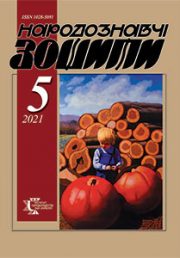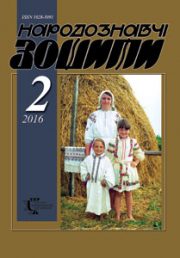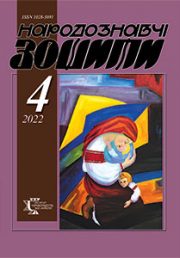The Ethnology Notebooks. 2017, 2 (134), 355—367
UDK 394.262.5 (477.86)
DOI https://doi.org/10.15407/nz2017.02.355
«NYNI MELANI, ZAVTRA VASYLI» (A FRAGMENT OF POKUTTIA WINTER CALENDAR RITUALITY)
Serebriakova Olena Heorhiivna, candidate of sciences in history, junior research fellow
of the department of the modern ethnology
of the Institute of Ethnology of the National Academy of Sciences of Ukraine.
Svobody Avenue 15, 79000, Lviv, Ukraine.
Contacts: Tel. (067)7117846; e-mail: o-sereb@ukr.net
ORCID ID: https://orcid.org/0000-0002-1039-2920
Abstract. The New Year`s ritual «Malanka» at the territory of Pokuttia is considered on the basis of published sources and personal field materials. Attention is paid to its structural elements, archaic beliefs, magic (matrimonial, householding, protective), the grade of preservation and local peculiarities of investigated phenomenon are demonstrated.
Keywords: «Malanka», maskers, songs, uproars, felicitations, reward, Pokuttia.
Received 23.02.2017
REFERENCES
Archive of the Institute of Ethnology of the National Academy of Sciences of Ukraine. F. 1. Op. 2. Od. zb. 698. Ark. 1—116 [in Ukrainian].
Archive of the Institute of Ethnology of the National Academy of Sciences of Ukraine. F. 1. Op. 2. Od. zb. 704. Ark. 1—399 [in Ukrainian].
Babij, V. & Muliarchyk, V. (2001). Rizdviani obriady. In Serafyntsi (Yanhoriv). Etnohrafichni statti, spohady, vsiachyna. Ivano-Frankivs’k [in Ukrainian].
Vinogradova, L.N. (1982). Zimnjaja kalendarnaja pojezija zapadnyh i vostochnyh slavjan: Genezis i tipologija koljadirovanija. Moskva: Nauka [in Russian].
Vinogradova, L.N. & Plotnikova, L.A. (1999). Kreshhenie (Bogojavlenie) In N.I. Tolstoj (Ed.), Slavjanskie drevnosti: Jetnolingvisticheskij slovar’: v 5-ti t. (Vol. 2: D — K (Kroshki), pp. 667—672). Moskva: Mezhdunarodnye otnoshenija [in Russian].
Horoshko, L. (2011). «Vodytse-ordanytse, umyj mene vid vsiakoho lykha» (Obriadove za-stosuvannia osviachenoi na Jordan vody v karpats’kij tradytsii). In Kalendarna obriadovist’ u zhyttiediial’nosti etnosu. Zbirka naukovykh prats’: materialy Mizhnarodnoi naukovoi konferentsii «Odes’ki etnohrafichni chytannia». Odesa [in Ukrainian].
Kaminets’kyj, V. (2010). Istoriia sela Yaseniv Pil’nyj: Z rozpovidej zhyteliv sela ta arkhivnykh materialiv. Ivano-Frankivs’k: Misto NV [in Ukrainian].
Kyryliuk, O. (2003). Universalii kul’tury i semiotyka dyskursu: kazka ta obriad. — Odesa: Avtohraf [in Ukrainian].
Kurochkin, O. (1995). Ukrains’ki novorichni obriady: «Koza» i «Malanka» (z istorii narodnykh masok). Opishne: Ukrains’ke narodoznavstvo [in Ukrainian].
Kutel’makh, K. (1995). Pradavnia osnova v kalendarnij obriadovosti ukraintsiv Karpat. Narodoznavchi zoshyty, 4, 204—208 [in Ukrainian].
Levkievskaja, E.E. (2009). Sazha. In N.I. Tolstogo (Ed.), Slavjanskie drevnosti: Jetno-lingvisticheskij slovar’: v 5-ti t. (Vol. 4: P (Pereprava cherez vodu) — S (Sito), pp. 533—534). Moskva: Mezhdunarodnye otnoshenija [in Russian].
Belous, M. Iv. (sobrav iz ust naroda). (1907). Malanka. Narodnyj obhod v navecherіe sv. Vasilіja i Novogo Goda. Vtoryj naklad. Kolomyja: Cherenkami i nakladom M. Belousa [in Ukrainian].
Marusyk, P. (2000). «Beleluie, kolysko moia!». Istoriia, etnohrafiia, pobut pokuts’koho sela. Halych [in Ukrainian].
Marchuk, V.V., Marchuk, H.I. &. Marchuk, N.V. (2010). Torhovytsia. Storinky istorii. Ivano-Frankivs’k: LIK [in Ukrainian].
Mokhoruk, D. (2008). Selo moie Toporivtsi. Etnohrafichnyj obraz sela. (Vol. 6). Kosiv: Pysanyj Kamin’ [in Ukrainian].
Nikitina, A.V. (2002). Russkaja tradicionnaja kul’tura: Uchebnoe posobie dlja ino-strancev. Sankt-Peterburg: Izd-vo S.-Peterb. un-ta [in Russian].
Petrushevich, A.S. (1865). Obshherusskіj dnevnіk cerkovnyh, narodnyh, semejnyh prazdnikov i hozjajstvennyh zanjatіj, primet i gadanіj. L’vov [in Ukrainian].
Propp, V.Ja. (1963). Russkie agrarnye prazdniki. (Opyt istoriko-jetnograficheskogo issledovanija). Leningrad: Izd-vo Leningrad. un-ta [in Russian].
Sokolova, V.K. (1987). Kalendarnye prazdniki i obrjady. In Jetnografija vostochnyh slavjan: Ocherki tradicionnoj kul’tury. Moskva: Nauka [in Russian].
Kolberg, O. (1882). Pokucie. Obraz etnograficzny. (Vol. 1). Krakόw: W drukarni uniwersytetu Jagiellońskiego [in Polish].
Mroczko, K. (1897). Śniatyńszczyzna. (Przyczynek do etnografii krajowej). In Przewodnik naukowy i literacki. (R. XXV, T. XXV, Zesz. IV, Kwiecień pp. 289—304). Lwów [in Polish].
Waigel, L. (1887). Rys miasta Kołomyi. Kołomyja: Drukiem H. Zadembskiego i spólki [in Polish].






